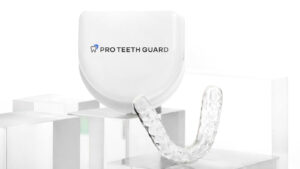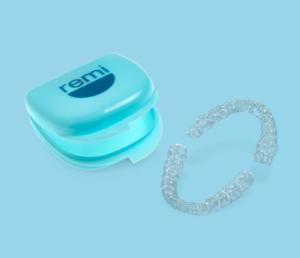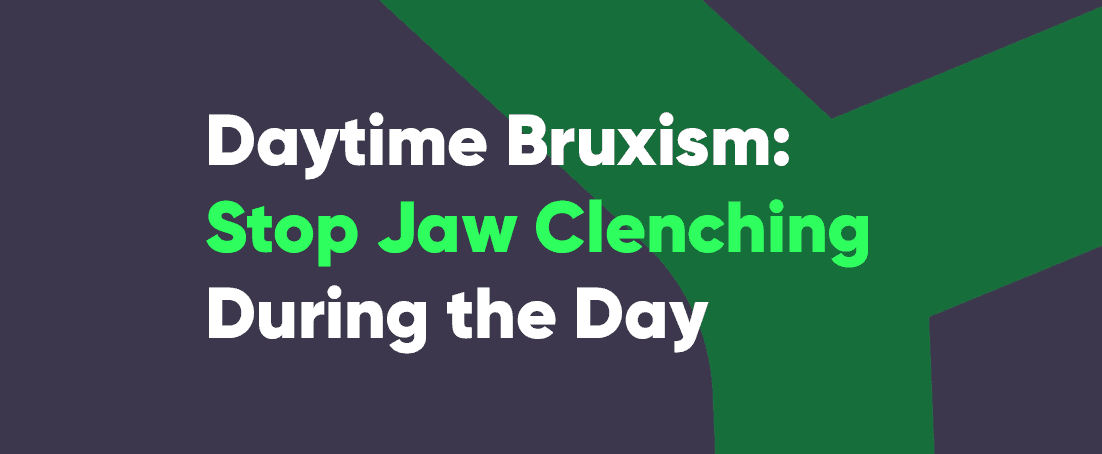Have you ever caught yourself grinding your teeth during the day? That’s daytime bruxism in action. No frills, no fuss—just a straightforward reality check on the clenching chaos wreaking havoc on your teeth in broad daylight.
Daytime bruxism isn’t your typical nighttime grind. It’s the covert culprit stealing your dental peace while you’re wide awake. This unconscious habit brings unwanted companions like jaw pain, headaches, and worn-down teeth, disrupting your daily activities.
Many seem to think that daytime bruxism or teeth-grinding is difficult to deal with. While the underlying causes, such as stress, anxiety, and other nervous issues, will take time to deal with, there are a few simple strategies to help you alleviate the bruxism symptoms right away. This article is all about them.
Daytime Bruxism Symptoms
Daytime bruxism is usually an alarm that subtly signals body distress you might not consciously realize. Stress, anxiety disorders, or ADHD may cause teeth grinding, which also adds complexity to the symptoms. However, there are some straightforward bruxism symptoms you should look for before taking action.
- Jaw pain or tightness. Persistent discomfort in the jaw area
- Tooth wear or damage. Noticeable changes in tooth structure
- Increased tooth sensitivity. Heightened response to hot or cold stimuli
- Gum recession. Gradual exposure of tooth roots
- Headaches. Especially recurrent temple throbbing
- Facial pain or soreness. Discomfort extending beyond the jaw
- Tired or tight jaw muscles. Feeling jaw fatigue
- Earache without ear Infections. Unexplained ear discomfort
- Discomfort when biting or chewing. General pain during everyday activities
- Cheek biting damage. Unintentional self-inflicted injuries
- Clicking or popping of the jaw joint. Audible joint disruptions
- Changes in bite alignment. It’s the shifting of the way teeth meet
Causes of Grinding Teeth and Jaw Clenching During the Day
Bruxism has various triggers, influencing unconscious clenching throughout the day and, in many cases, during the night as well. Let’s dive into the reasons why your jaw may unconsciously clench:
Stress and anxiety cause the body to enter the fight-or-flight response, which, although psychological, generates physical muscle tension, leading to unconscious teeth clenching.
Misaligned teeth make jaw muscles work naturally, which, after some time, produces unconscious teeth grinding.
Response to pain elsewhere in the body may lead to reflexive tension in the jaw muscles attempt to distract from the discomfort.
Habitual chewing (e.g., on pens and nails) creates muscle memory patterns that may get triggered unconsciously anytime during the day.
Certain medicaments, such as antidepressants or stimulants, can cause daytime bruxism as they impact normal motor functions.
Mild stimulants (e.g., caffeine, nicotine) may also cause bruxism because they disrupt normal sleep patterns.
Neurological disorders, such as epilepsy or dementia, may cause bruxism due to their complex effect on the nervous system.
Sleep apnea results in pauses of breathing, which reinforces bruxism. However, studies are yet to prove conclusively whether the link is causal or just a correlation.
Stress’s Role in Jaw Clenching Throughout the Day
Stress, a pervasive part of modern life, triggers a plethora of negative side effects – from heart issues and hormonal or digestive disorders to various nervous ticks and clenching jaw. Some side effects of stress may cause jaw tightness on their own, but starting to treat stress as a root cause might be more effective.
The way stress causes excessive clenching is multifaceted. The most immediate reaction to stress is the body’s psychophysiological response. When we are under stress, the body releases cortisol, a hormone that heightens alertness and causes muscle tension. Constant stress creates unnatural nervous ticks in various parts of the body, including the jaw.
Such a response intertwines with the already mentioned fight or flight response. As cortisol reduces unnecessary functions, it prepares the body to focus only on what is essential for survival. In other words, the body prepares itself to allocate resources for either fighting or fleeing a situation that is perceived as life-threatening.
The problem is that modern life does not have many legitimately life-threatening situations, but psychologically, we still may perceive them as such. Constant stress at a job, for example, can move our bodies out of a balanced state, which creates a vicious cycle.
Our sleep gets disrupted, the body’s resources become sparse, and a weakened body perceives more stress. It is coupled with heightened emotional responses because someone with chronic stress might perceive more situations as potential stress triggers.
How to Stop Daytime Bruxism
Stress is one of the main reasons for jaw clenching, so breaking out of a vicious stress cycle is the first thing you should do to stop daytime bruxism. Various mindfulness practices, yoga and meditation exercises, or simply getting enough rest is crucial. However, managing stress is a long-term goal. In some cases, it might even require you to go to therapy or start using medication.
That’s why it’s beneficial to take immediate action to reduce jaw-clenching symptoms. Mewing jaw exercises are beneficial as they strengthen your jawline and give you more control. It is especially true if the cause of your bruxism is misaligned teeth or improper bite. Mewing also takes time, but you don’t need to resort to surgery right away – at-home dental appliances might help.
Mouth guards are already advanced enough, so you can customize them at home and get online consultations from dental specialists. These appliances act as a barrier between your upper and lower teeth, protecting them from grinding while keeping the jaw aligned.
1. Choosing Daytime Mouth Guards for Dental Protection
Selecting the right daytime mouthguard is crucial for effective bruxism management. There are many great options on the market, but after extensive research, I have narrowed them to two.


These two guards are best for safeguarding your teeth from severe grinding while balancing affordability and at-home convenience. My Pro Teeth Guard review makes a point about it being praised for its effectiveness and a wide selection of soft and hard mouthguards.
Remi mouthguards are not far behind with their friendly pricing and a well-streamlined direct-to-consumer process. Read more about it in the Remi Mouth Guard review.
2. Stress Management and Relaxation Techniques for Alleviating Bruxism
Stress plays a significant role in bruxism, and adopting effective stress-management techniques contributes to alleviating teeth grinding. Here’s a list of practical strategies:
- Mindfulness Meditation
- Yoga for Relaxation
- Progressive Muscle Relaxation (PMR)
- Deep Breathing Exercises
- Guided Imagery
By incorporating these stress-management techniques into your routine, you create a holistic approach to reduce bruxism, addressing the physical manifestations and the underlying stressors like teeth-chattering anxiety.
3. Jaw Exercises to Strengthen and Relax Muscles
While mouthguards are effective for protecting the teeth, they will not strengthen your jaw muscles or help to relax them if they are tense. There are many effective jawline exercisers covered in this blog. Below are a few of the most simple ones.
- Chin Tucks – a simple exercise involving gently moving your chin towards your chest, holding it for a few seconds, and then moving it back. Repeat to alleviate tension.
- Jaw Stretching by opening your mouth wide open and holding it for a few seconds can do wonders. If you have jaw mobility issues, do not overdo it, and try to incorporate other exercises into your routine.
- Hard mewing is a practice of consistently increasing the pressure you produce with your tongue while mewing. Be careful not to practice it before you master ordinary mewing first.
- Stretching your neck also strengthens your jaw muscles as they are interconnected. Simply tilt your head back and look up at the ceiling. Hold such a position for 10 or 20 reps.
- Face Yoga exercises, such as the Lion Face, Air Kissing, or others, will also tone your muscles and potentially reduce bruxism.
Incorporating these exercises into your routine, along with targeted jawline exercisers, aids in strengthening and relaxing the jaw muscles, reducing bruxism symptoms.
4. Incorporating Physical Therapy into Clenching Treatment
Physical therapists, also known as physiotherapists, play a crucial role in guiding individuals through specific methods aimed at preserving, restoring, and strengthening certain muscles and bones for normal physical function. Usually, occurs for rehabilitation purposes, but it can also be practiced to improve movement and prevent possible disabilities or surgery.
The techniques used in physiotherapy include therapeutic exercises, physical modalities, such as massage, and the use of assistive devices. All of these methods can be applied to the jaw and the surrounding areas to treat bruxism or other issues.
Physiotherapy is proven to be effective as therapists are trained to adapt to the specific needs of the patient. However, such a route might be expensive and inconvenient as every part of the treatment is guided by a specialist. Starting to practice mewing before physiotherapy is advisable because it costs almost nothing and carries no risk.
5. Diet Changes to Aid in Controlling Clenching
Optimizing your diet plays a pivotal role in managing bruxism. Focus on foods that promote relaxation and muscle health, which usually is a generally balanced diet. Below are the most common dietary changes for people with severe daytime jaw clenching.
- Use supplements for magnesium and vitamin D
- Consume foods rich in calcium, such as nuts and dairy products
- Avoid stimulants or medicaments that function similarly
- Promote gut health with products such as yogurt or kefir
- Phytochemicals found in green tea are great for balancing energy levels and reducing stress.
6. Limit Caffeine and Alcohol to Control Daytime Teeth Grinding
Caffeine stimulates your central nervous system, increasing cognitive function and muscle activity. While achieving these functions, it may cause excessive muscle movements in the jaw. This effect is strengthened if caffeine is consumed before bedtime as it then may disrupt your sleep cycle.
Alcohol functions a bit differently, as it relaxes muscles. However, after it wears off, the body goes after a stress phase, which might trigger teeth grinding. It usually happens while you sleep but might also be triggered during the day.
What is common for both Alcohol and caffeine is that they tend to lead to dehydration. When the body lacks water, cortisol levels might increase, which leads to teeth grinding. The solution in both cases is quite simple – limit your caffeine and alcohol intake.
Approaching Professional Care for Persistent Daytime Bruxism
If none of the above methods help your bruxism, seeking professional advice is paramount. Dental or medical professionals conduct thorough assessments to determine the root causes and tailor effective treatment plans.
Early intervention prevents potential dental complications, such as tooth wear, and addresses underlying health concerns. Professional guidance in managing persistent bruxism contributes to a comprehensive approach to your oral and overall well-being.
Treatment Strategies for Ongoing Jaw Clenching
Professional treatment options for ongoing jaw clenching encompass various approaches tailored to the severity and individual needs.
- Mouth Guards and Splints: Dentists can recommend using a mouth guard or splints to provide a protective barrier between teeth, preventing dental damage caused by clenching.
- Bite Adjustments: In some cases, dentists may suggest adjusting the bite alignment to alleviate pressure on the jaw joints and reduce clenching. Mewing here also comes into play as a valid alternative.
Other strategies not mentioned before include behavioral and biofeedback therapies, muscle relaxants, and stress relief medications. All of these treatments are prescribed by doctors and usually apply to very severe cases of daytime bruxism. Medicaments also carry significant health risks unrelated to bruxism, so it’s better to try less-invasive methods first.
Tackling TMJ Disorder Related to Daytime Teeth Clenching
The intricate relationship between TMJ (temporomandibular joint) disorders and bruxism is significant, especially in daytime teeth clenching. Persistent Clenching places undue stress on the TMJ, potentially leading to long-term disorders. Symptoms include jaw pain, clicking, and limited mouth movement.
Various treatments address TMJ disorders linked to daytime teeth clenching. Treatments may include:
- Night Guards/Mouth Splints
- Physical therapy
- Medication including pain relievers, muscle relaxants, and anti-inflammatories
- Stress management
- Orthodontic solutions, e.g., Bite correction
- Surgery (in severe cases)
Consequences of Unconsciously Clenching Every Day
Clenching your teeth unconsciously for a long time affects your oral health significantly. You will first notice some tooth damage, such as clenching worn tooth enamel, which can increase sensitivity and tooth decay. Tooth problems are often followed by jaw strain and pain, which might make it harder to eat chewy foods.
In some cases, such pain might travel and create constant headaches or earaches that may carrier over to the night. Clenching disrupts your sleep, which greatly impacts your overall health, so you become vulnerable to various other diseases. Most notably, sleep apnea and vitamin deficiencies are often linked with bruxism.
Conquering Daytime Bruxism for Better Sleep and Dental Health
Here, I advocated proactive strategies, such as daytime mouthguards, stress management, jaw exercises, and dietary changes to fight Bruxism. If you feel any of the symptoms of bruxism, I encourage you to take immediate steps to safeguard your dental health and overall well-being.






